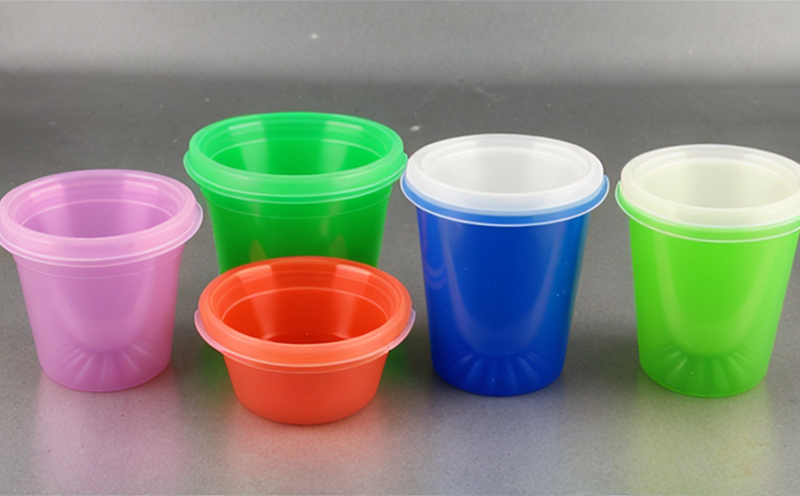NF EN ISO 306 Vicat Softening Point Testing of Disposable Plastics
The Vicat softening point is a fundamental thermal property that provides critical insights into the behavior and performance of disposable plastics under heat stress. This test, governed by NF EN ISO 306, is essential for ensuring product quality and compliance with regulatory requirements in sectors such as healthcare, consumer goods, and packaging.
The Vicat softening point measures the temperature at which a plastic sample begins to soften and deform when subjected to increasing heat under defined conditions. This parameter is crucial for predicting how disposable plastics will perform during sterilization processes, storage, and use. Accurate determination of this property ensures that products meet both safety standards and performance expectations.
The testing procedure involves placing a standard test sample in contact with the surface of an oil bath maintained at a gradually increasing temperature. The sample is subjected to a specified load (typically 1 kg) and the point at which it begins to deform by a predetermined amount (usually 1 mm or 2 mm depending on the specific ISO variant) is recorded as its Vicat softening point.
Understanding this critical property helps manufacturers optimize material selection, design for durability, and ensure compliance with international standards like NF EN ISO 306. By accurately measuring the Vicat softening point, companies can improve product reliability, enhance consumer safety, and maintain a competitive edge in the marketplace.
The Vicat softening point is particularly important for disposable plastics used in single-use medical devices, food packaging, and other applications where thermal stability is paramount. This test ensures that the materials used in these products will not degrade or melt at temperatures encountered during use or storage, thereby maintaining product integrity and safety.
Accurate measurement of this property also facilitates compliance with global regulations such as NF EN ISO 306, which sets stringent standards for testing methods to ensure consistency across different laboratories. By adhering to these standards, manufacturers can demonstrate their commitment to quality control and regulatory compliance, thereby building trust with customers and stakeholders.
Furthermore, the Vicat softening point test provides valuable data that supports ongoing research and development efforts in materials science. It allows for the exploration of new polymers and plastic blends, helping engineers design products that not only meet current standards but also anticipate future requirements. This forward-thinking approach ensures that manufacturers stay at the forefront of innovation while maintaining a strong commitment to product quality.
Accurate measurement of the Vicat softening point is essential for ensuring product reliability, enhancing consumer safety, and maintaining compliance with international standards. By adhering to NF EN ISO 306, manufacturers can demonstrate their commitment to quality control and regulatory compliance, thereby building trust with customers and stakeholders. This test provides valuable data that supports ongoing research and development efforts in materials science.
Understanding the Vicat softening point is crucial for predicting how disposable plastics will behave under heat stress during sterilization processes, storage, and use. Accurate measurement of this property ensures that products meet both safety standards and performance expectations. The test involves placing a standard test sample in contact with an oil bath maintained at a gradually increasing temperature while subjecting it to a specified load.
The Vicat softening point is particularly important for disposable plastics used in single-use medical devices, food packaging, and other applications where thermal stability is paramount. This test ensures that the materials used in these products will not degrade or melt at temperatures encountered during use or storage, thereby maintaining product integrity and safety.
Accurate measurement of this property facilitates compliance with global regulations such as NF EN ISO 306, which sets stringent standards for testing methods to ensure consistency across different laboratories. By adhering to these standards, manufacturers can demonstrate their commitment to quality control and regulatory compliance. This test provides valuable data that supports ongoing research and development efforts in materials science.
Understanding the Vicat softening point is crucial for predicting how disposable plastics will behave under heat stress during sterilization processes, storage, and use. Accurate measurement of this property ensures that products meet both safety standards and performance expectations. The test involves placing a standard test sample in contact with an oil bath maintained at a gradually increasing temperature while subjecting it to a specified load.
The Vicat softening point is particularly important for disposable plastics used in single-use medical devices, food packaging, and other applications where thermal stability is paramount. This test ensures that the materials used in these products will not degrade or melt at temperatures encountered during use or storage, thereby maintaining product integrity and safety.





